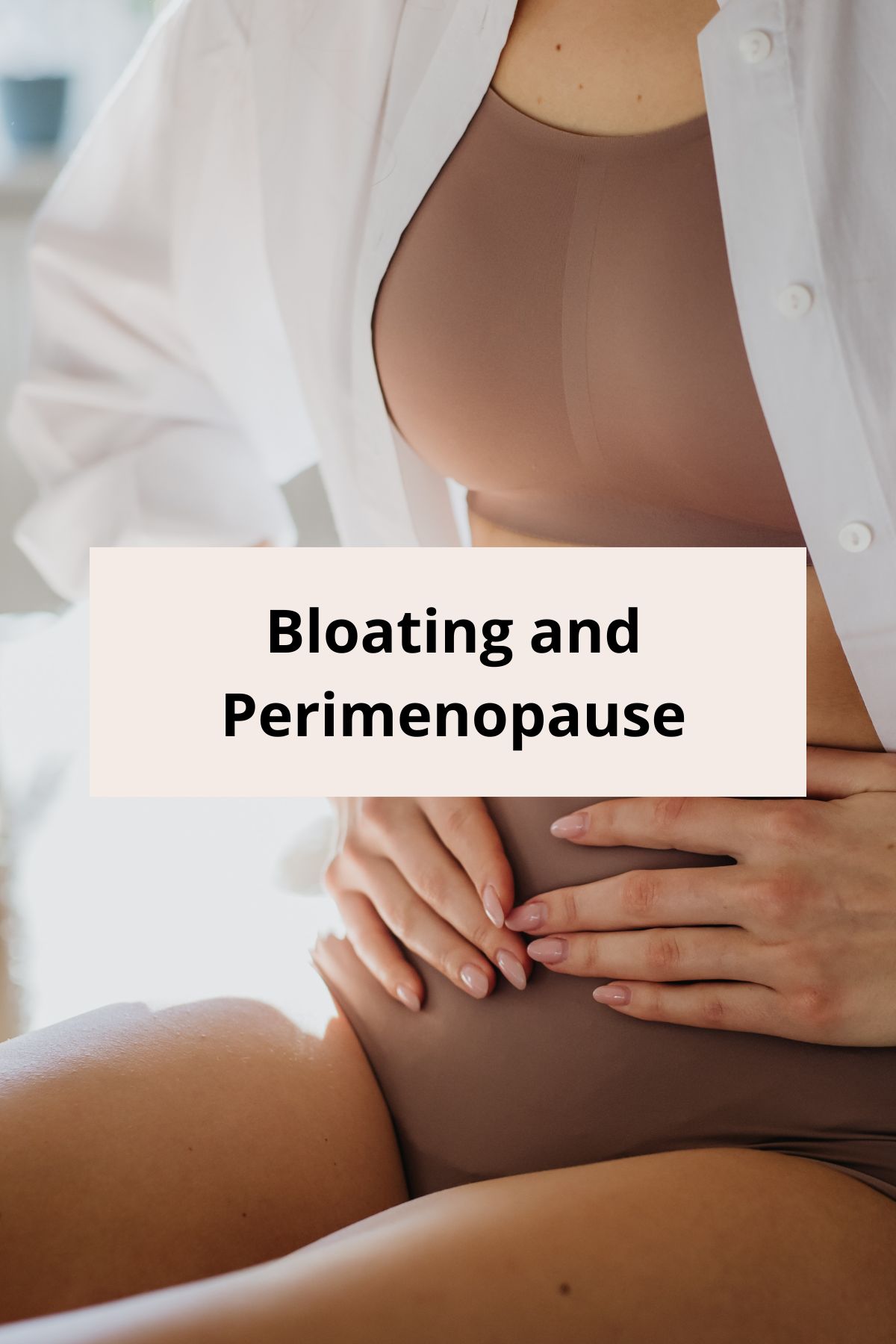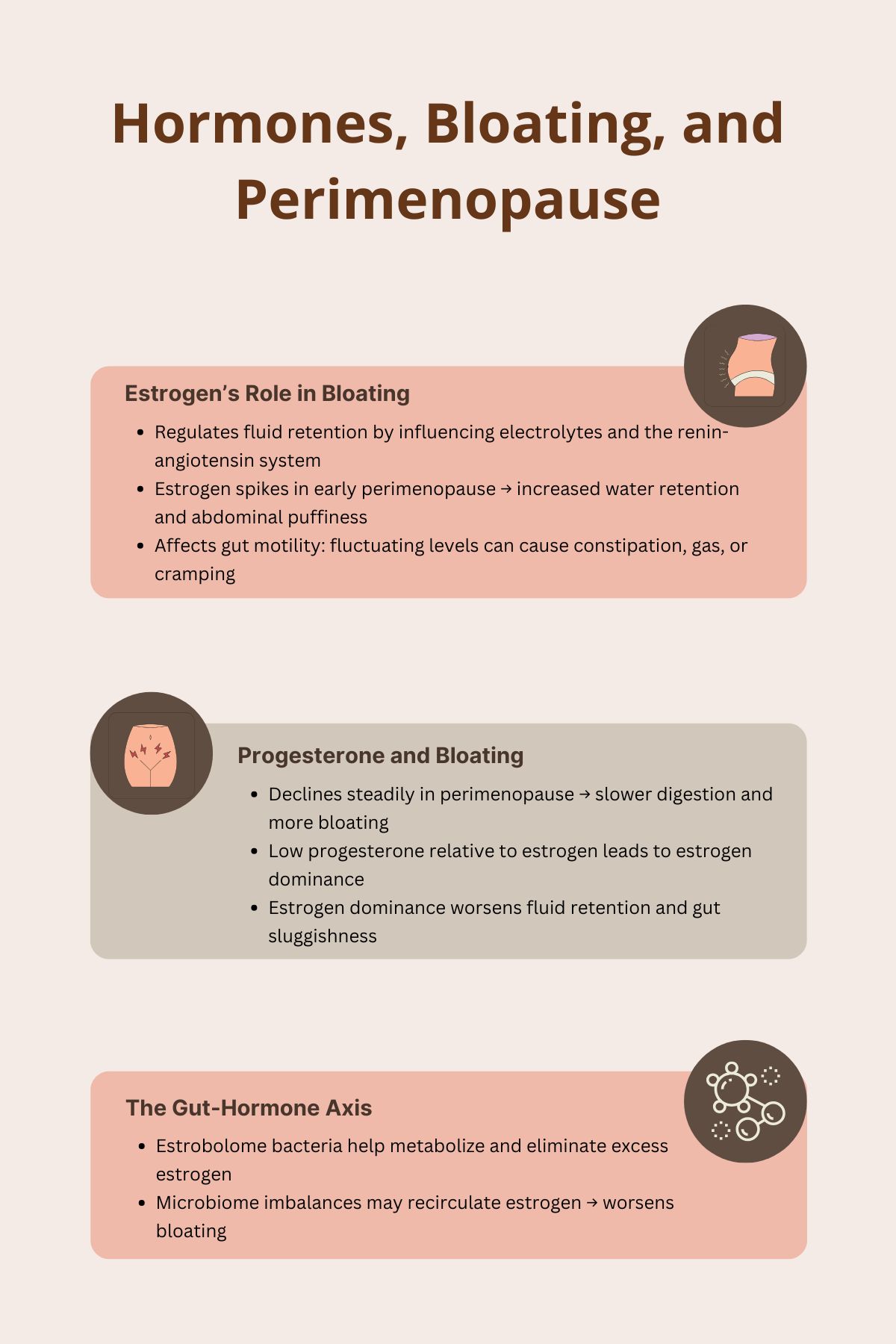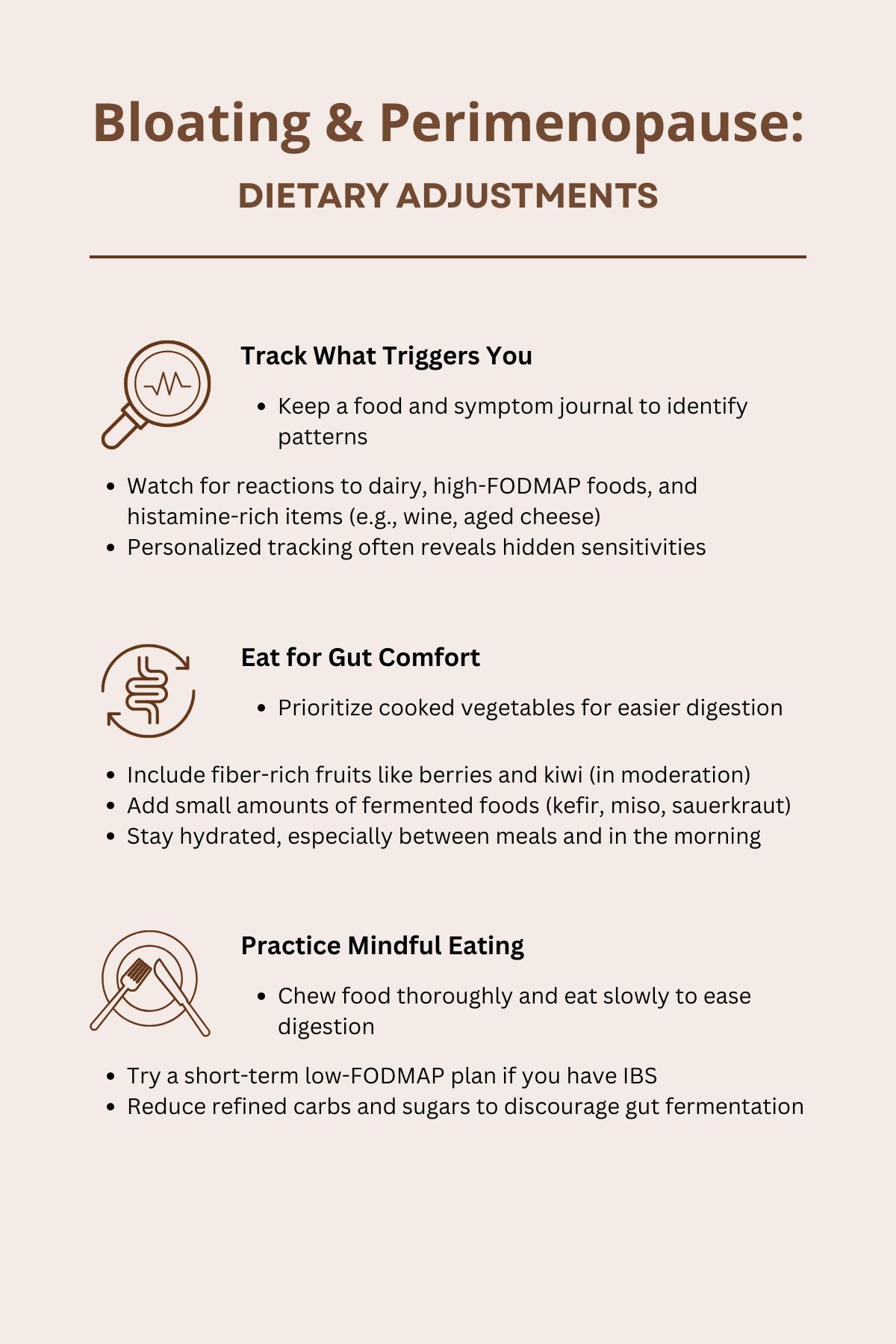Bloating and perimenopause often show up hand in hand, leaving many women confused and frustrated by sudden changes in how their bodies feel and respond to food, stress, and even their menstrual cycles. Whether it’s the post-meal puffiness, abdominal tightness, or the mysterious overnight weight gain that won’t budge, bloating during this life stage is more common than most realize.

Perimenopause—the transitional window leading up to menopause—typically begins in a woman’s 40s but can start as early as her mid-30s. It’s marked by fluctuating levels of estrogen and progesterone, which impact not only menstrual cycles but also digestion, metabolism, and inflammation. Bloating, though frequently dismissed as a minor nuisance, can be a signal that the body is adjusting to deeper hormonal and physiological changes.
Many women describe feeling “off”—their digestion isn’t as efficient, their jeans fit tighter by the evening, and familiar foods suddenly seem to cause discomfort. These are not isolated experiences. Bloating in perimenopause is driven by a complex interplay of hormones, gut function, stress, and diet—all of which shift significantly during this phase of life.
This article explores the physiological reasons why bloating becomes more prevalent during perimenopause, how hormones influence digestion and fluid retention, and what evidence-based strategies can help women reduce discomfort and feel more at ease in their bodies again.
Understanding Perimenopause and Hormonal Shifts
Perimenopause marks the years leading up to menopause, when the ovaries gradually produce less estrogen and progesterone. This hormonal fluctuation can begin as early as the mid-30s and typically spans 4 to 10 years. Unlike menopause, where hormone levels drop and stabilize, perimenopause is characterized by erratic hormonal patterns—some days may feel completely normal, while others bring mood swings, fatigue, heavy periods, or digestive changes like bloating.
Estrogen and progesterone play essential roles far beyond reproduction. Estrogen helps regulate body temperature, maintain bone density, and support serotonin production, while progesterone has a calming, stabilizing effect on the brain and gut. During perimenopause, estrogen can spike unpredictably while progesterone steadily declines, leading to imbalances that affect various systems in the body—including the digestive tract.
These hormonal swings can disrupt:
- Gut motility (how fast or slow food moves through the intestines),
- Fluid balance (leading to water retention or puffiness),
- Inflammatory responses (which can heighten food sensitivity and discomfort).
Additionally, perimenopause coincides with changes in thyroid activity, adrenal function, and the gut microbiome, all of which can compound the experience of bloating and other digestive symptoms.
Women often report new or worsening symptoms during this phase: fatigue, heavier or irregular periods, weight gain, and a sense that their body is no longer operating like it used to. Understanding the root cause—hormonal volatility—can be a powerful first step in managing these changes proactively.
The Hormone–Bloating Connection
The link between hormonal fluctuations and bloating during perimenopause is both physiological and multi-layered. As estrogen and progesterone levels begin to shift unpredictably, their downstream effects on digestion, fluid regulation, and fat distribution can lead to the frustrating symptom of bloating—even when diet and lifestyle haven’t changed dramatically.

1. Estrogen’s Role
Estrogen influences fluid retention by modulating the balance of electrolytes and the renin-angiotensin system, which helps regulate blood pressure and fluid balance. When estrogen levels spike—as they often do erratically in early perimenopause—water retention increases, leading to feelings of puffiness, particularly around the abdomen.
Estrogen also affects gut motility. At optimal levels, it helps maintain smooth muscle tone in the gastrointestinal tract. However, fluctuating levels can either slow down or speed up digestion, resulting in symptoms like constipation, gas, or cramping. Additionally, research has shown that higher estrogen may contribute to increased visceral fat, which can make bloating feel more prominent due to space restrictions in the abdominal cavity.
2. Progesterone’s Role
Progesterone tends to decline more steadily throughout perimenopause. As a natural muscle relaxant, progesterone slows down digestive transit. When levels drop too low relative to estrogen, it can impair digestion, leading to bloating, gas buildup, and discomfort.
This estrogen dominance—a state where estrogen is elevated relative to progesterone—amplifies fluid retention and gut sluggishness. The imbalance, not just the hormone levels alone, is often the culprit.
3. The Gut-Hormone Axis
Emerging research points to a bidirectional relationship between the gut and the endocrine system, often referred to as the gut-hormone axis. Hormonal changes impact the gut microbiome—the diverse colony of bacteria that help digest food, regulate immunity, and even influence estrogen metabolism.
- The estrobolome, a subset of gut bacteria, helps metabolize and clear excess estrogen. When the microbiome is imbalanced (due to stress, diet, antibiotics), it may lead to recirculation of estrogen, exacerbating bloating and hormone symptoms.
- In turn, inflammation and dysbiosis in the gut can impair estrogen clearance, creating a feedback loop that worsens both digestive and hormonal symptoms.
Understanding this interplay helps reframe bloating not just as a digestive issue, but as a whole-body hormonal signal during perimenopause.
Other Causes of Bloating During Perimenopause
While hormonal fluctuations play a central role, bloating during perimenopause is rarely due to hormones alone. Multiple overlapping factors—especially dietary habits, lifestyle patterns, and changes in digestive capacity—can intensify the experience of bloating. Understanding these additional contributors is essential for a well-rounded approach to relief.
1. Dietary Triggers
As the body becomes more sensitive during perimenopause, certain foods may begin to provoke gas, discomfort, or abdominal distension—even if they never caused problems before.
- High-FODMAP foods (fermentable oligosaccharides, disaccharides, monosaccharides, and polyols) like onions, garlic, legumes, apples, and wheat can ferment in the gut, leading to gas and bloating—especially when gut motility is slowed by low progesterone.
- Artificial sweeteners such as sorbitol, xylitol, and mannitol—common in sugar-free gums and diet foods—are poorly absorbed and easily fermented in the colon.
- Carbonated beverages introduce air directly into the digestive tract, worsening distension.
- High-sodium diets promote water retention, particularly when estrogen levels are unstable.
- Dairy intolerance can increase with age due to reduced lactase production, contributing to gas, cramps, and bloating.
Even “healthy” foods, such as cruciferous vegetables (e.g., broccoli, cabbage), can cause bloating in women with increased gut sensitivity—especially if eaten raw or in large amounts.
2. Lifestyle Contributors
Beyond food, several behavioral and environmental factors can intensify perimenopausal bloating:
- Chronic stress increases cortisol levels, which can alter gut permeability and slow digestion. Prolonged stress contributes to “gut-brain axis dysregulation” and inflammatory responses in midlife women.
- Physical inactivity reduces gut motility and lymphatic flow, leading to constipation and fluid buildup.
- Dehydration slows digestion and contributes to constipation-related bloating.
- Irregular eating habits, such as skipping meals or eating late at night, can disrupt circadian digestion patterns, particularly when hormone rhythms are already unstable.
Many women also report increased sensitivity to alcohol and caffeine, which can further irritate the gut lining and alter bowel patterns during this transitional stage.
Managing Bloating in Perimenopause: What Works
Managing bloating in perimenopause requires a multifaceted approach that supports hormone balance, digestive health, and lifestyle alignment. While there’s no one-size-fits-all solution, many women find significant relief by making small, consistent changes in how they eat, move, and manage stress.

1. Dietary Adjustments
A proactive first step is to keep a food and symptom journal. Tracking what you eat and how your body responds can help uncover personal triggers, which may vary from common culprits like dairy or high-FODMAP foods to lesser-known sensitivities like histamine-rich foods (e.g., wine, aged cheeses, smoked meats).
Recommended dietary strategies:
- Focus on gut-friendly foods:
- Cooked vegetables (easier to digest than raw)
- Fiber-rich fruits like berries and kiwi (but avoid overloading)
- Fermented foods like kefir, sauerkraut, or miso—in moderation
- Stay hydrated, especially in the morning and between meals.
- Chew food thoroughly and eat slowly to reduce swallowed air and support digestion.
- Consider a low-FODMAP approach (temporarily), particularly for women with IBS-like symptoms. Work with a qualified professional for proper reintroduction phases.
Some women also benefit from reducing refined carbohydrates and sugars, which can ferment in the gut and feed dysbiotic bacteria.
2. Lifestyle Modifications
Lifestyle tweaks can be just as powerful as dietary changes in easing perimenopausal bloating:
- Exercise regularly, focusing on low-impact movement like walking, yoga, or Pilates to stimulate digestion and reduce stress.
- Stress management is key: Techniques like mindfulness meditation, deep breathing, and progressive muscle relaxation have been shown to lower cortisol, which in turn can improve gut motility and reduce inflammation.
- Sleep regulation: Aim for 7–9 hours per night and maintain consistent sleep-wake times. Poor sleep disrupts cortisol rhythms and increases gut sensitivity.
- Avoid long periods of sitting, which can slow digestion. Gentle stretching or short walks after meals can help reduce gas buildup.
3. Over-the-Counter and Supplement Support
(Use with caution and under medical guidance)
- Simethicone: Helps reduce gas bubbles in the gut and may relieve pressure.
- Activated charcoal: Occasionally used for gas relief, though not recommended for frequent use.
- Digestive enzymes: Can support nutrient absorption and reduce bloating, especially if enzyme production is declining.
- Magnesium citrate or glycinate: May relieve constipation-related bloating and support muscle relaxation.
- Probiotics: Strain-specific probiotics may help regulate bowel movements and support the estrobolome, but results vary by individual.
When to Seek Medical Advice
While bloating is often a benign and manageable symptom of perimenopause, it’s important to recognize when bloating may signal something more serious. Women in their 40s and 50s are at an age when risks for certain conditions—like ovarian cancer, fibroids, or gastrointestinal disorders—begin to rise, and persistent bloating shouldn’t be dismissed.
Red Flag Symptoms That Warrant Medical Evaluation:
- Bloating that is severe, constant, or worsening over time
- Unexplained weight loss without changes in diet or exercise
- Changes in bowel habits, such as chronic constipation, diarrhea, or alternating patterns
- Abdominal or pelvic pain, especially if it’s sharp, localized, or interferes with daily function
- Visible abdominal swelling not related to weight gain
- Blood in stool or abnormal vaginal bleeding between periods or after menopause
These symptoms could indicate underlying issues such as:
- Ovarian cysts or tumors
- Uterine fibroids
- Endometriosis (which can persist into perimenopause)
- Inflammatory bowel disease (IBD)
- Small intestinal bacterial overgrowth (SIBO)
- Colorectal or ovarian cancer
Why You Should Talk to Your Provider
Hormonal changes during perimenopause can complicate symptom tracking and mask the presence of other conditions. That’s why it’s essential to maintain regular check-ups, especially when:
- New symptoms arise suddenly
- Current strategies aren’t improving bloating
- You’re unsure whether your bloating is hormone-related or digestive in origin
A provider can recommend appropriate testing—such as pelvic ultrasounds, GI panels, or hormone panels—to rule out serious concerns and offer more personalized guidance.
Bloating and Perimenopause: Conculsion
Bloating and perimenopause often go hand in hand, but this uncomfortable symptom doesn’t have to be your new normal. As hormone levels rise and fall unpredictably, the body sends signals in many forms—bloating being one of the most common and misunderstood. By tuning into those signals and making targeted changes, many women find meaningful relief.
Throughout this transitional phase, it’s important to remember that bloating isn’t just about what you eat. It’s about how your hormones, gut, stress levels, and lifestyle all interact—a complex but understandable puzzle. Estrogen and progesterone affect digestion, fluid balance, and even the gut microbiome. Add stress, poor sleep, or dietary triggers to the mix, and the bloating intensifies.
The good news? There are strategies that work. From gentle movement and food tracking to targeted dietary shifts and stress management, you have tools at your disposal. And when symptoms persist or become disruptive, seeking medical advice ensures you’re not overlooking something important.
This phase of life is a time of recalibration—not decline. By approaching symptoms like bloating with curiosity and compassion, you can regain comfort in your body and deepen your understanding of what it needs. Perimenopause is a journey—and you don’t have to navigate it alone.
